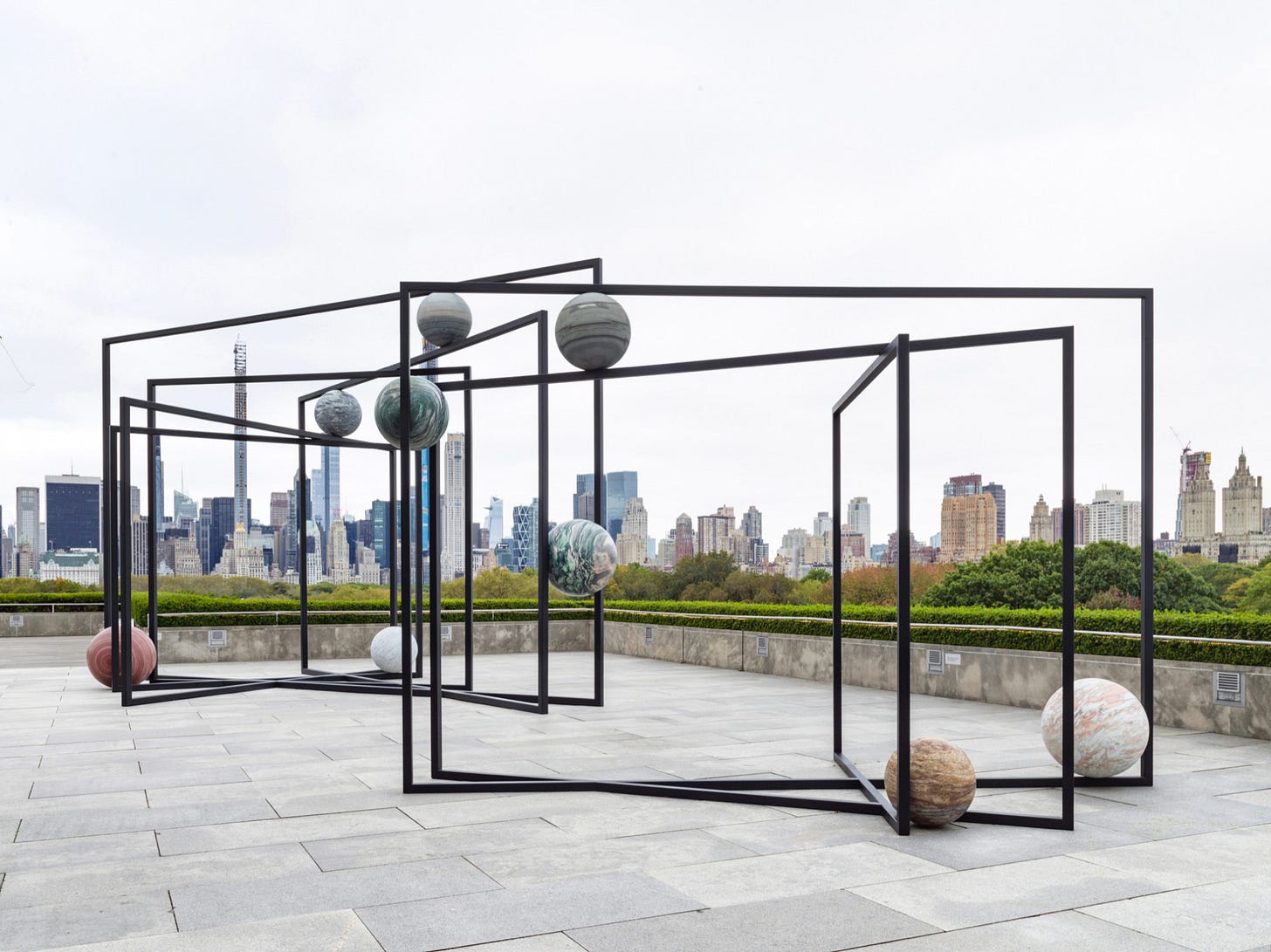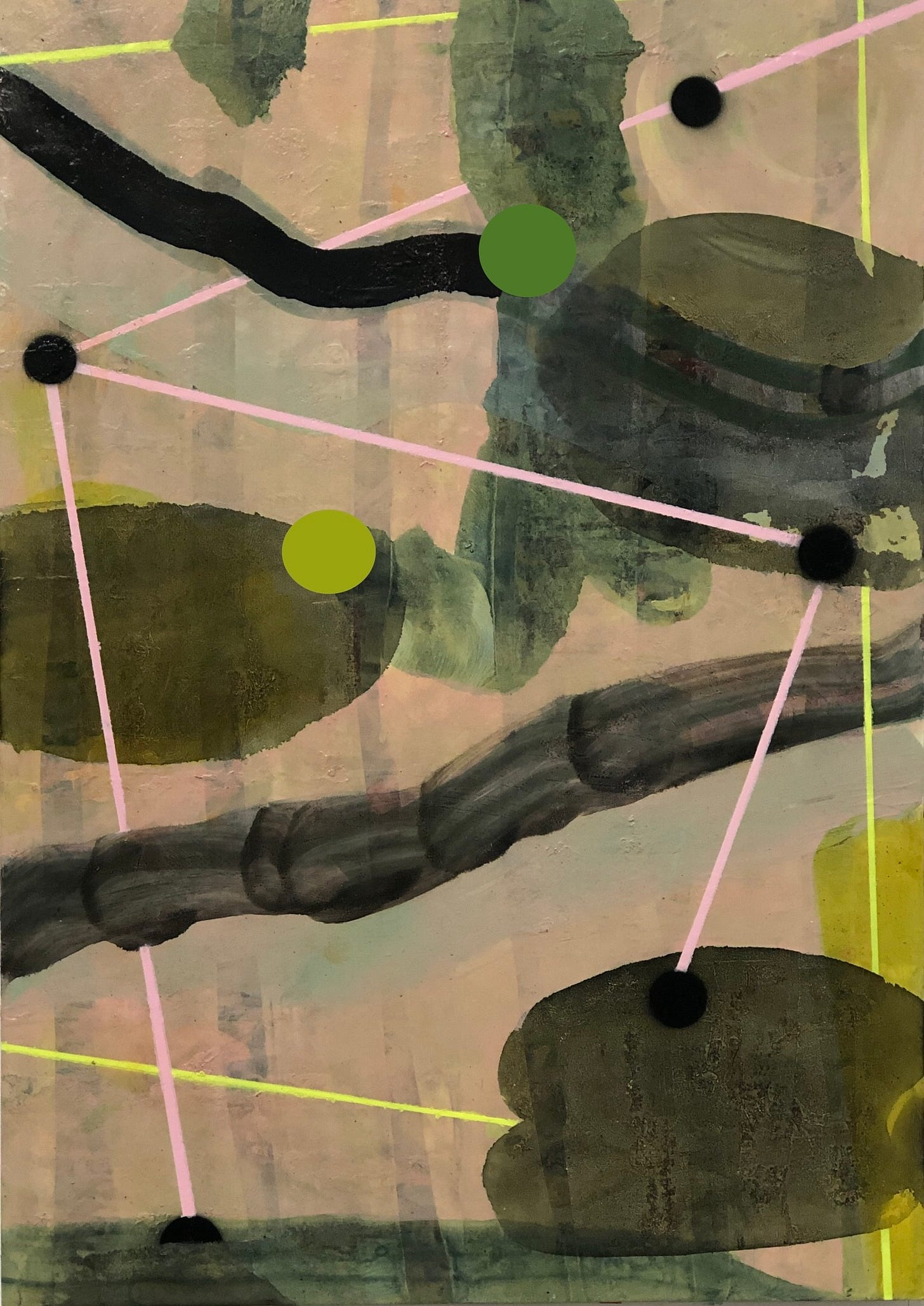The End of the World as We Know It?
Taking comfort from art and history in the age of Artificial Intelligence
Last week as I watched the British Prime Minister Rishi Sunak in discussion with Elon Musk at the first government-level AI Safety Summit held in the UK, I was struck once again by the short-term thinking of politicians. Sunak needs all the good news coverage he can get at the moment what with his government’s popularity sinking in the polls and the election on the horizon. So the attempt to position the UK as a leading player in the field of Artificial Intelligence was a real win for him as global leaders convened in the English countryside for the summit. It was also a big win for him to score an interview with one of the world’s richest and most powerful men. With an audience of millions, Sunak was able to tick his way through key political messages, pointing out all the good stuff that AI will bring to healthcare, education, and investment in the UK tech industry.
But the other more important point of the summit was to address the potential dangers of AI, and there was a familiarity in the lack of urgency to take action. Sort of similar to the COP climate and biodiversity summits, where vague agreements are signed by governments and promises are made to think about thinking about doing something in the future. Sunak said something nebulous about how we shouldn’t rush to regulate AI without fully understanding the risks. But given the breakneck speed at which AI is developing, do we have the luxury of time? Since open source AI - code that is freely available for anyone to access - is about a year behind the capabilities of the leading tech companies, government regulation already seems a bit irrelevant. AI is arguably beyond anyone’s control.
I try not to think very much about the dangers of Artificial Intelligence anymore, because I find the potential scenarios that could emerge even within the next decade almost too much to wrap my head around. Elon Musk himself has warned that it is an existential threat to humanity. Given he’s the founder of various AI tech companies, he should know a thing or two about it.
We are already seeing the troubling effects of algorithms in social media that exploit the weaknesses and biases of the human mind. AI doesn’t need to have consciousness to develop intimate relationships with humans. And I’m not talking about intimacy in the sense of Joaquin Phoenix falling in love with an AI bot in a Hollywood movie. I’m talking about the intimacy that comes from presenting language in particular ways that can control people. Divisive and polarising content and misinformation that is taken as truth is already leading to the break down of trust in relationships, in institutions, and in democratic structures. Democracy depends on open conversation, but if our knowledge comes from a public sphere which is mainly this online hot mess, how will democracy survive?
That’s one troubling scenario. But there are many more. Artificial Intelligence will soon be so clever that bad actors, or even bedroom geeks, will be able to use it for all sorts of nefarious means. Hacking energy supply lines? Developing super-efficient biotech chemicals? Bringing down the global banking system? Getting access to nuclear codes? It’s all coming for us, folks. What to do about it though? Even the tech leaders in Artificial Intelligence are struggling to say anything to reassure us. No one has a flipping clue what’s going to happen now this genie is out of the bottle.
I got into thinking about this after reading Yuval Noah Harari’s book Homo Deus: A Brief History of Tomorrow earlier on this year, and that’s when things really started to take a dark and fascinating turn for me on this subject. Harari is a philosopher and professor in the Department of History at the Hebrew University of Jerusalem, and has become a leading public voice in conversations about our future with these new technologies.
In his book Harari suggests that we are reaching the end of human history, at which point culture will be shaped by a non-human alien intelligence. AI tools are gaining mastery over our language, and once that happens we’re into a world of illusions. Words, images, sounds, numbers — these are all languages through which we understand ourselves and our world. Our experience of reality is always through this cultural prism of language. We use language to create stories, laws, religious beliefs, art, science, money, everything we know and understand. At the moment the AI tools are largely imitating the information we have fed it, but if AI can manipulate and generate language itself — and we’re already hearing stories from developers about this happening — Harari raises the prospect of what it would be like to live in a culture that we didn’t create, a post-humanist world. Here is a great talk Harari gave at a conference on this subject five months ago — he’s a brilliant speaker:
There are lots of things I find interesting about this subject, but something that Harari really made me think about is our culturally mediated understanding of reality when the boundaries of what it means to be human are shifting. He says:
Each and every one of us has been born into a given historical reality, ruled by particular norms and values, and managed by a unique economic and political system. We take this reality for granted, thinking it natural, inevitable and immutable. We forget that our world was created by an accidental chain of events, and that history shaped not only our technology, politics and society, but also our thoughts, fears and dreams… we seldom try to shake ourselves free and envision alternative futures.
We can’t know what’s coming, Harari says, but looking at the past, studying the changes that have happened to our ancestors that they couldn’t possibly have imagined, is liberating and allows us to be aware of the possibility of something else.
This all makes me think of the work of the Polish artist Alicja Kwade, whose sculptures and installations are about time and perception. In her work she interrogates what reality is and why we live by the systems, rules and logics of society. She describes herself as a non-believer, someone who constantly questions what people tell her is the truth, why she should accept things as normal, why things exist.
Kwade’s best known work is an installation called ParaPivot which was commissioned for the rooftop at the Metropolitan Museum in New York back in 2019. It was made up of nine carved and polished stone spheres, representing the planets, suspended among intersecting steel frames. There’s a lot of illusion in it — the stones weigh several tons, but they appear to be weightlessly floating on the steel framework. As you walk around the sculpture the views through to the famous New York skyline shift and change. There’s something in it about the insignificance of our cultural achievements in the context of the vast cosmos; the absurdity of the idea that we are all standing on a spinning sphere somewhere in the universe which puts our made-up laws, institutions, structures and systems into a very different perspective.
Ideas about post-humanism and our mediated reality also remind me of the conversations I have had with the painter Connor McIntyre about his work, which is a response to the physical and conceptual systems underpinning our knowledge and experience of the world. He prompts viewers to question alternative possibilities beyond the dominant structures that shape our lives today. With the rapid developments in science and technology what once appeared linear is now complex; rigid structures are starting to bend; online and offline worlds don’t exist in isolation but interact and influence one another, shaping narratives, identities, and social dynamics.
McIntyre visualises this ever-shifting understanding of reality in a painterly language somewhere between image and abstraction. There’s a tension in his work that suggests the line between structure and the disintegration of the systems we can’t see beyond. His limited colour palette functions to highlight the connections between the elements on the surface, and the high-key colour lines operate like pathways that draw attention to the uncertain structure of the whole. It is a cartography of sorts, one that suggests the interconnectivity of invisible systems, data flows and simultaneous temporalities.
I remember many years ago having a conversation with a friend who worked in Financial Tech. Given what I knew about her left-leaning politics I was intrigued as to why she would make a career in a field that seemed to focus so much on the benefits for the individual rather than the collective. The response she gave me seemed like total fantasy. She told me that in the not-so-distant future we would live in a system that didn’t involve capitalism as we know it, no centralised banks or national governments or institutions or taxes. We would function together as localised networks dependent on the kind of systems she was involved in developing in the online space. As we hurtle into the AI-dominated future her vision seems less and less fantastical. Or at least like Kwade I’m questioning our perception of reality, holding on to Harari’s words about liberating ourselves from the past, and most of all like McIntyre I’m trying to be hopeful for the potential of radical new systems to come.
As always I’d love to know your thoughts on any of these artists and ideas so please click on the comment button below to leave a message.
Become a Patron of The Gallery Companion
As a patron of The GC you become part of a private conversation space where we talk about the art we’ve seen recently, share images and links to interesting stuff, and discuss ideas together. In the chat thread this week, I’ve shared some thoughts on the current exhibition at the Fitzwilliam Museum in Cambridge, Black Atlantic: Power, People, Resistance. It’s about how enslavement and empire shaped the Fitzwilliam Museum’s collection, which was founded from a slave trader’s legacy and still brings in money for the museum.
Subscribe for just $5 per month and join the conversation!





This post situates this vision of a future of artificial intelligence (AI) within the context of art and as always, Victoria, you make us think more deeply about the human condition. AI only needs to gain a command of language in order to create havoc and it is already doing this with greater and greater efficiency. As Harari says in the YouTue video link you provide: 'For thousands of years humans have always been haunted by a much deeper fear; humans have always appreciated the power of stories and images and language to manipulate our minds and to create illusions' (22.00mins). The potential of this is truly frightening.
It was the BBC's Books & Author's podcast. Here's the link: https://www.bbc.co.uk/programmes/m001ry44